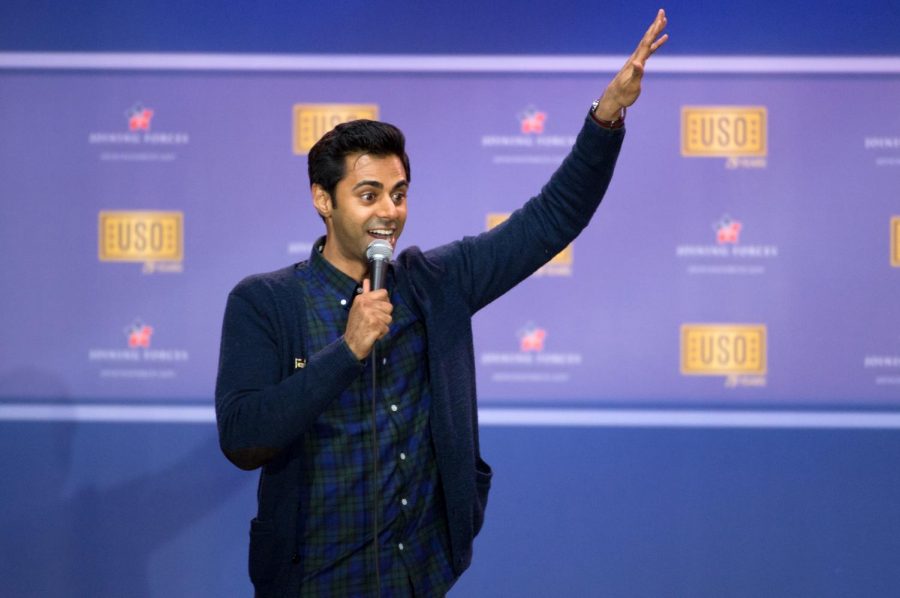Netflix deactivates Hasan Minhaj’s Patriot Act
Hasan Minhaj’s Patriot Act
January 23, 2019
After a controversial year for the Saudi Arabia government’s image, the government officials began 2019 by asking Netflix to block an episode of “Patriot Act with Hasan Minhaj,” a comedy show that dealt with comedian Hasan Minhaj’s ideas about the Saudi government, from being viewed within the country, claiming it clashed with their anti-cybercrime laws.
As the news of Washington Post journalist Jamal Khashoggi’s death reached the rest of the world, an assassination that the CIA concluded was ordered by Saudi Crown Prince Mohammed bin Salman, comedian Hasan Minhaj focused one of his episodes from the Netflix show “Patriot Act” on the United States’ relationship to Saudi Arabia and Mohammed’s reputation as a reformer after he gave women the right to drive.
Like comedians often are, Minhaj was blunt and unapologetic for his argument as he made sure his opposition to the Saudi government was understood. A couple of months after the release of the episode, the Saudi government reached out to Netflix and asked them to ban the show within Saudi Arabia and Netflix complied.
In his discussion about Saudi Arabia’s actions, Minhaj slams Mohammed for his controversial actions over the past couple of years.
“It took the killing of a Washington Post journalist for everyone to go, ‘Oh, I guess he’s really not a reformer,’” Minhaj said of Mohammed on the episode. He also compares the alliance between the U.S. and Saudi Arabia to a “marriage of convenience,” and blatantly calls him a dictator rather than a modern reformer, and criticizes his interference in Yemen, accusing him of using Yemen as a war ground in Saudi’s long-standing dispute with Iran.
The Prince responds to Minhaj’s ideas when his administration asked Netflix to ban the episode within Saudi boundaries on the grounds of Article 6 of the country’s anti-cybercrime law that threatens imprisonment for up to 5 years for “production, preparation, transmission, or storage of material impinging on public order, religious values, public morals, and privacy, through the information network or computers.”
“We strongly support artistic freedom worldwide and only removed this episode in Saudi Arabia after we had received a valid legal request,” Netflix said in a statement to the Washington Post.
The episode has since been uploaded to Youtube and is open to the rest of the world on Netflix.
“Clearly, the best way to stop somebody from watching something is to ban it, make it trend online, and then leave it up on YouTube,” Minhaj tweeted. “Let’s not forget that the world’s largest humanitarian crisis is happening in Yemen right now.”
Both the Saudi government and Netflix have received criticism since the incident.
Samah Hadid, Middle East Director of Campaigns at Amnesty International, called out the government for constantly stifling the voices that oppose the government, saying, “The authorities have previously used anti-cyber-crime laws to silence dissidents, creating an environment of fear for those who dare to speak up in Saudi Arabia. “Saudi Arabia’s censorship of Netflix using a cyber-crime law comes as no surprise and is further proof of a relentless crackdown on freedom of expression in the Kingdom,”
Chris Bryant MP, a member of the foreign affairs committee, added that pulling the episode was “just naked cowardice on the part of Netflix”.
However, some have expressed understanding for Netflix agreeing to the demands of the government.
“Companies have to walk this tightrope between their cosmopolitan values on one side and realizing that going abroad into many emerging markets is a contact sport,” Sam Blatteis told Jim Rutenburg of the New York Times. “You have to roll up your sleeves and that can involve adapting and compromise.” Blatteis is the former public policy lead for Google and YouTube in the Gulf and now chief executive for MENA Catalysts, a Middle East government affairs consulting firm.
As of January 23, the Saudi government has yet to publicly comment on this incident.


